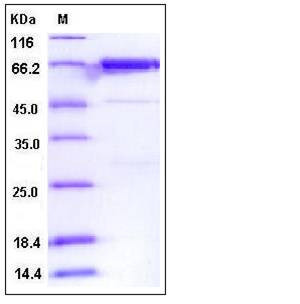Human PTK6 / Brk Protein (GST Tag)
BRK
- 100ug (NPP4200) Please inquiry
| Catalog Number | P10682-H09B |
|---|---|
| Organism Species | Human |
| Host | Baculovirus-Insect Cells |
| Synonyms | BRK |
| Molecular Weight | The recombinant human GST/PTK6 chimera consists of 676 amino acids and predicts a molecular mass of 78 kDa. It migrates as an approximately 70 kDa band in SDS-PAGE under reducing conditions. |
| predicted N | Met |
| SDS-PAGE |  |
| Purity | > 89 % as determined by SDS-PAGE |
| Protein Construction | A DNA sequence encoding the full length of human PTK6 (NP_005966.1) (Met 1-Thr 451) was fused with the GST tag at the N-terminus. |
| Bio-activity | Kinase activity untested |
| Research Area | Cancer |Signal transduction |Akt Pathway |Intracellular Kinases in the Akt Pathway |
| Formulation | Supplied as sterile 50mM Tris, 100mM NaCl, pH 8.0, 10% glycerol 1. Normally 5 % - 8 % trehalose, mannitol and 0.01% Tween80 are added as protectants before lyophilization. Specific concentrations are included in the hardcopy of COA. |
| Background | Tyrosine kinase (PTKs) is a protein that carry out tyrosine phosphorylation, which play a fundamental role in cell proliferation, survival, adhesion, and motility and have also been demenstrated to mediate malignant cell transformation. Overexpression of this protein in mammary epithelial cells leads to sensitization of the cells to epidermal growth factor and results in a partially transformed phenotype. Two classes of PTKs are present in cells: the transmembrane receptor PTKs and the non-receptor PTKs. Tyrosine kinase(PTKs)-6/ BRK is a cytoplasmic non-receptor protein kinase which may function as an intracellular signal transducer in epithelial tissues. Tyrosine kinase(PTKs)-6/ BRK has been shown to undergo autophosphorylation. It has been found that the constitutive expression of the tyrosine kinase(PTKs)-6/ BRK is in a large proportion of cutaneous T-cell lymphomas and other transformed T- and B-cell populations. State BRK expression was also induced in normal T-cells. In clinical, the cytoplasmic tyrosine kinase PTK6 (BRK) shows elevated expression in approximately two-thirds of primary breast tumours, and is implicated in EGF receptor-dependent signalling and epithelial tumorigenesis. |
| Reference |
